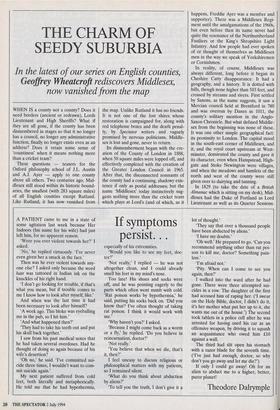Sophia Waugh (Mrs Watson, I should say) ends her first
page with a reference to her subject being 'the only woman ever to look stylish in a uniform (she was Com- mandant of the Wrens).' That is nonsense. I could name several knock-out sailor girls to match Dame Felicity Peake in her paler WAAF outfit. I do, however, recall Winston Churchill dictating a very firm, even curt, refusal of Princess Marina's request to be allowed to share the privilege, granted to her increasingly embonpoint-encumbered and commoner- born sister-in-law, Queen Consort Eliza- beth, of being able to stick to mufti throughout World War II. But Wrens were fortunately always the most fanciable of girls, and their Commandant the most beautiful of all.
The young Kents passed for an uxorious couple and that, despite Georgie's past Anyone for tennis?' The Kents were the handsomest couple about pre-war London, as well as the only royal one often across the Channel, visiting their many relations and friends there. Politics — the monarchy in abeyance had kept the Duke of Kent from visiting Greece before 1938, but the Athenians were then pleased to hear him declare that `Greece has given me a wife, the full extent of whose influence over me I shall probably never know'. It is true that that wife did not have a single drop of Greek blood in her, but if, as I did, you had seen her, scarf about her beautiful head, praying in a little, whitewashed, Greek country church, you would not have known it. Giving the Duff Cooper Literary Prize to Paddy Leigh Fer- mor, she modestly thought her Greek not as good as his, but the Church and liturgy she was most at home in was the Greek.
What the Kents would have made of Australia — where they were due for several years' hard labour as the King's representatives, until the outbreak of war prevented that — or the Strines of them, we shall never know, though Princess Alexandra has had a great success Down Under, as she has everywhere else in the world. No doubt Mr Mandela, on his


























































 Previous page
Previous page